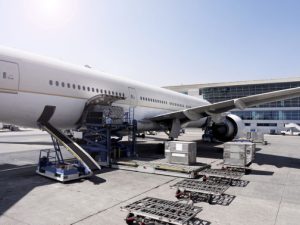As Singapore’s air shipment demands grow, logistics companies are adapting to meet the evolving needs. Factors driving this demand include the rise of e-commerce and the increasing need for faster delivery times. Technology trends, such as advanced tracking systems and automation, are transforming air shipment logistics. To keep up with the escalating demands, companies are implementing new strategies, such as optimizing routes and enhancing warehouse capabilities. As a result, the future outlook for air shipment in Singapore looks promising, with logistics firms actively adjusting their operations to accommodate the growing demand.

Factors Driving Air Shipment Demand in Singapore
To understand the factors driving air shipment demand in Singapore, you need to consider the rapid growth of e-commerce and international trade. The surge in online shopping has significantly increased the need for efficient and timely delivery of goods, prompting many businesses to opt for air shipment to meet customer demands. Additionally, Singapore’s strategic location as a global trade hub has led to a continuous rise in international trade activities, further fueling the demand for air freight services. With the increasing interconnectedness of the global economy, businesses are seeking faster and more reliable shipping options, making air shipment a preferred choice. As a result, logistics companies in Singapore are witnessing a growing need to adapt their operations to accommodate the rising demand for air freight services.
Technology Trends in Air Shipment Logistics
Considering the growing demand for air shipment in Singapore, you must acknowledge the pivotal role of technology trends in streamlining logistics operations and meeting the increasing need for efficient and timely delivery. The implementation of real-time tracking systems allows for precise monitoring of cargo, providing transparency and accountability throughout the supply chain. Additionally, the use of advanced analytics and machine learning algorithms enables logistics companies to optimize route planning, minimize fuel consumption, and reduce operational costs. Automation and robotics play a significant role in expediting the handling and sorting of packages, leading to faster processing times and improved accuracy. Furthermore, the integration of cloud-based platforms facilitates seamless communication and data sharing among various stakeholders, enhancing collaboration and decision-making. Embracing these technology trends is essential for logistics companies to meet the escalating demand for air shipment services in Singapore.
Strategies for Meeting Escalating Air Shipment Demands
To effectively meet the escalating demands for air shipment in Singapore, implement innovative strategies to optimize operational efficiency and enhance delivery capabilities. Embrace advanced technology solutions like real-time tracking systems to provide customers with visibility and control over their shipments. Streamline processes by leveraging data analytics to forecast demand patterns and allocate resources effectively. Explore partnerships with airlines to secure dedicated cargo space and ensure reliable capacity during peak periods. Invest in workforce training to enhance skills and productivity, enabling smoother operations and faster turnaround times. Consider implementing flexible pricing models to incentivize off-peak shipments, balancing demand and capacity utilization. Additionally, expanding and optimizing warehouse facilities near airports can reduce transit times and support quicker order processing. By adopting these strategies, logistics companies can effectively manage the increasing air shipment demands in Singapore.
Future Outlook for Air Shipment in Singapore
As air shipment demands continue to soar, it’s essential for logistics companies in Singapore to anticipate future trends and adapt their operations accordingly. The future outlook for air shipment in Singapore points towards a sustained upward trajectory, driven by e-commerce growth, technological advancements, and the region’s position as a global trade hub. Anticipated trends include an increasing focus on sustainability, with a push for eco-friendly aviation technologies and carbon-neutral initiatives. Moreover, the rise of advanced tracking and automation systems is expected to streamline processes and enhance supply chain visibility. To stay ahead, logistics companies should invest in cutting-edge technologies, expand their air freight capabilities, and strengthen partnerships with airlines. Embracing these changes will not only meet the growing demand but also ensure Singapore remains a key player in the global air shipment industry.
